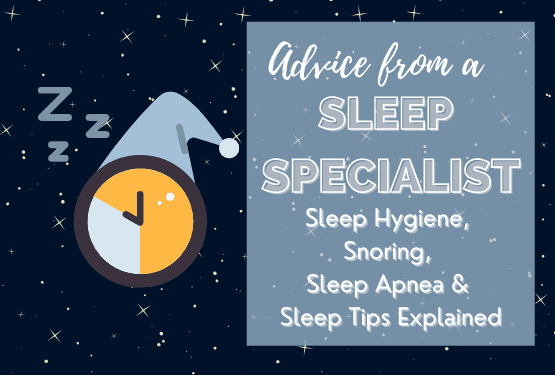This post may contain affiliate links, which means we may receive a small commission when you make a purchase at NO additional cost to you. Thank you for supporting our site in this way!
Sleep. It’s what we spend a third of our lives doing. But sleep can be difficult to come by. That’s why I asked a sleep specialist to explain sleep hygiene, snoring, and sleep apnea. She also provides us with some healthy sleep tips.

I turned to Dr. Mariana Bedoya, an Assistant Professor of Pediatrics at Vanderbilt University Medical Center specializing in Pediatric Pulmonary and Sleep Medicine. She has been my son’s sleep specialist at Monroe Carell Jr. Children’s Hospital at Vanderbilt for over a year and we’ve learned so much from our appointments with her.
Healthy Sleep Tips
We met Dr. Bedoya when we had been on a search to uncover the root of my son’s severe headaches. After many trips to the doctor that didn’t provide answers, we found our way to Dr. Bedoya. She suggested a Sleep Study which finally provided the answers we needed.
While the diagnosis was hard to hear, the information it provided for us was invaluable.
Even if you’re not dealing with a clinical sleep disorder, everyone can benefit from these healthy sleep tips and improved sleep hygiene.
Sleep Hygiene
The term “sleep hygiene” refers to a series of healthy sleep habits that can improve your ability to fall asleep and stay asleep, and include:
- Have a soothing bedtime routine. Keep the room at a comfortable temperature
- Keep a set wake and sleep time. Avoid changing the sleep time and wake time on the weekends by more than 1 hour.
- Avoid late-night TV/tablet/phone and other electronics for at least 30-60 minutes before bed and no electronics in the middle of the night. When you look at a brightly lit screen before bed, it can trick your body clock to a level of daytime-level alertness
- Avoid caffeine (tea, soda, chocolate milk) at least 6 hours before bedtime
- Exercise regularly and maintain a healthy diet.
Keep in mind that sleep hygiene will not look the same for everyone. You can read my simple tips to improve sleep if you want even more recommendations and products for better sleep.
Snoring & Sleep Apnea
Snoring can be heard in children and may not cause any trouble; however, it is important to monitor symptoms of sleep apnea. Sleep apnea is a disorder where there is obstruction of the air going through the airway, which can cause poor sleep quality and sometimes a decrease in oxygen levels during sleep.
Children and adolescents may have snoring, pauses in breathing, gasping for air, and/or multiple nighttime awakenings. Some patients wake up tired or are sleepy during the day. In children, some may not have daytime sleepiness, but may develop difficulties with focusing, concentration, memory, or behavioral concerns such as hyperactivity or irritability.
If you are concerned about these symptoms, talk to your pediatrician or primary care doctor. You may need a referral to a sleep specialist.
If you suspect you or your partner may suffer from the same symptoms, follow the same advice by following up with your primary physician.
Watch my entire interview with Dr. Bedoya below:
Vanderbilt Sleep Disorders Center is accredited by the American Academy of Sleep Medicine (AASM). Providers are available for adults and pediatric patients.